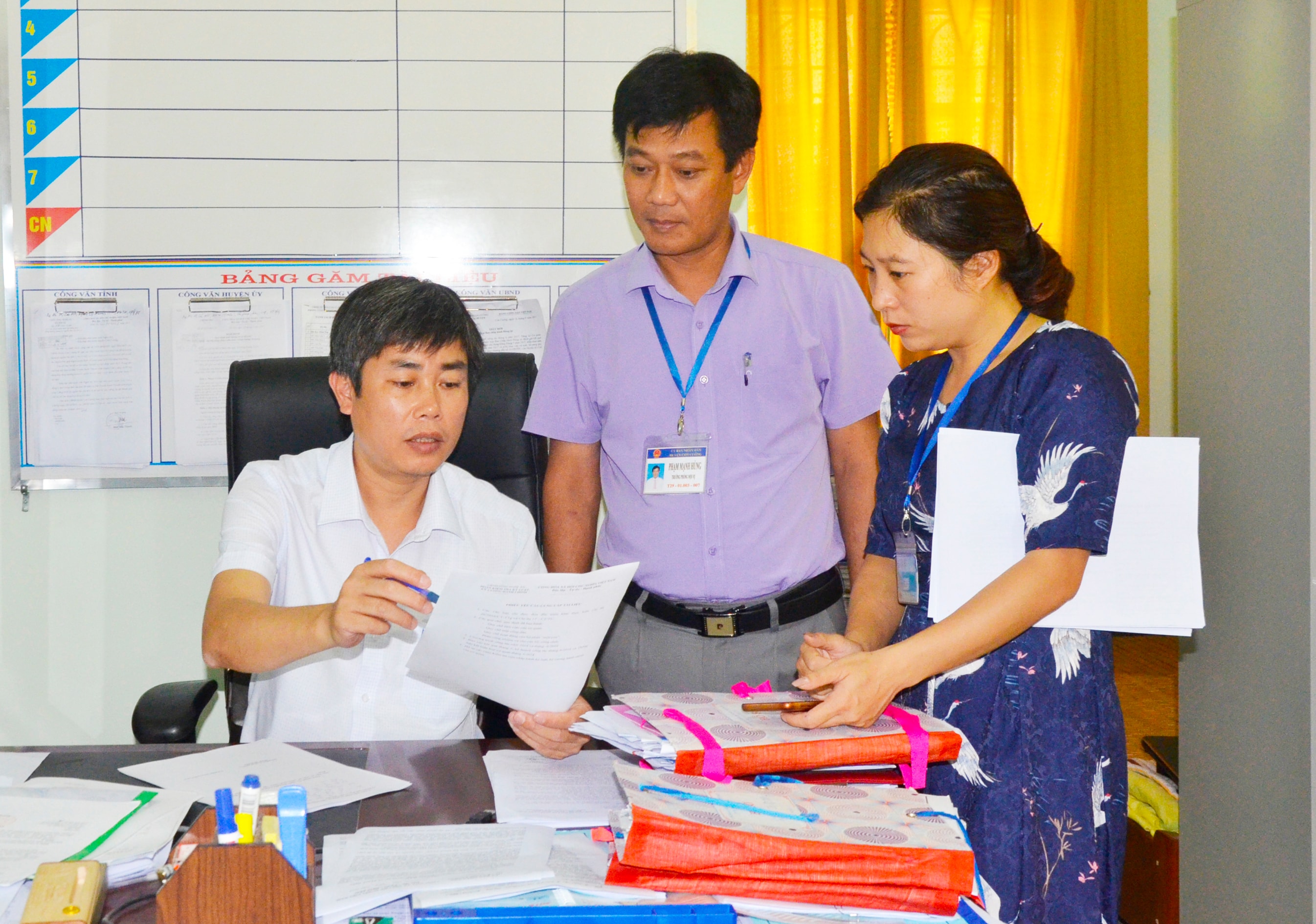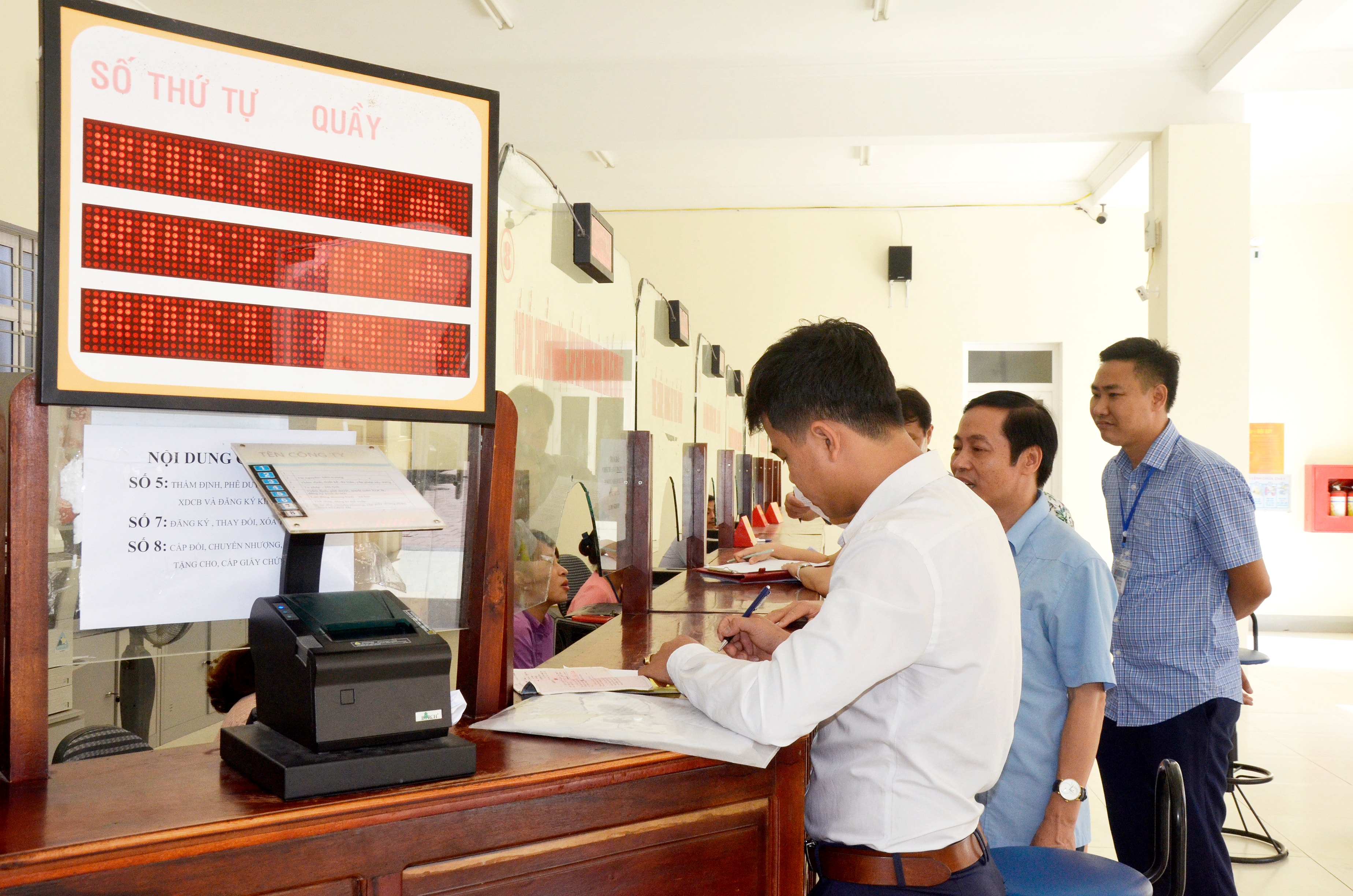Correcting the situation of being late and forgetting work in performing official duties
(Baonghean) - In fact, through the annual inspection and examination of the performance of duties and powers of cadres and civil servants, it is shown that many cadres and civil servants have not fulfilled their responsibilities in performing public duties. They are slow in handling assigned tasks, there are also cases of avoiding work, forgetting work, violating the Law on Cadres and Civil Servants...
The rate of slow work completion remains high.
Along with the inspection of the implementation of discipline and administrative discipline at all levels and sectors, every year, the Provincial Inspectorate has coordinated with relevant sectors to organize inspections of responsibilities associated with public service inspections according to the Law on Cadres and Civil Servants. Thereby, pointing out the shortcomings and limitations in the performance of professional duties of cadres and civil servants of departments and offices in sectors and localities.
 |
| Checking the compliance with discipline and administrative order in Con Cuong district. Photo: Thanh Le |
For example, through an inspection in Do Luong district, the Provincial Inspectorate issued Decision No. 18/KL.TTR dated June 18, 2018, stating: In the implementation of professional tasks for specific jobs with prescribed completion deadlines: In 2016 and 2017, the People's Committee of Do Luong district received and processed 99,110 records; of which the number of records that were implemented late compared to regulations was 11/486 records, accounting for 11.59%. Regarding the implementation of extraordinary tasks (receiving and processing documents assigning tasks from the Provincial People's Committee and provincial departments, branches and sectors), the number of documents assigning tasks that were implemented late or not implemented compared to the prescribed time was 65 documents, accounting for 4.45%.
In Cua Lo town, through inspection, the number of documents assigning tasks of the Provincial People's Committee and provincial departments, branches and sectors that were implemented late or not implemented compared to the prescribed deadline was 86 documents, accounting for 3.91%. Regarding the implementation of professional tasks for specific jobs with regulations on completion deadlines, there were 380 documents that were implemented late, accounting for 2.37%.
According to the inspection team's assessment, the departments and units under the Town People's Committee basically processed the records within the prescribed time. However, there are still some departments that are often slow in handling tasks (Land Use Rights Registration Office: 320 records, accounting for 3.21%; Department of Natural Resources and Environment: 37 records, accounting for 3.21%; Urban Management Department: 10 records, accounting for 0.7%). In addition, at the time of inspection, some ISO processes and procedures applied by the Town People's Committee at specialized departments did not ensure their validity due to being built in violation of the provisions of current decrees and circulars, but the departments had not promptly amended or replaced them, such as: Administrative processes and procedures in the field of Natural Resources and Environment, the Office of Land Use Rights Registration publicly posted on the Electronic Information Portal of Cua Lo Town is applying the 2013 Land Law, Decree 181/ND-CP dated October 29, 2004 has expired. The process of "considering lunch support for children aged 3, 4, and 5" at the Department of Education and Training stipulates a processing time of 10 working days. However, in reality, the department does not apply the ISO process to process but receives, appraises and processes documents twice a year according to Joint Circular 09/2013 of the Ministry of Education and Training - Ministry of Finance - Ministry of Home Affairs guiding the lunch regime for preschool children...
In 2017, through public inspection work combined with law enforcement inspection, the Inspectorate discovered 59 units with violations; recommended review and experience drawing for 60 organizations and 302 individuals with violations in performing public duties (violations were mainly handling assigned tasks behind schedule), recommended administrative handling of 09 organizations and 06 individuals with violations.
The slow processing of work for individuals and organizations not only occurs in localities but also exists in departments and branches. In the first quarter of 2018, the results of handling interconnected administrative procedures in the investment sector were still 143 slow, in which the majority were files on procedures for approving investment policies (117 files); procedures for appraising and approving detailed construction plans at a scale of 1/500 (16 files)... Slow processing of work not only affects the effectiveness of state management in all fields but also causes difficulties and frustration for people, businesses and organizations.
Need to rectify and overcome promptly
According to the leader of the Provincial Inspectorate, every year through inspection work, the Inspectorate requires local authorities to organize reviews, clarify responsibilities, levels of violations and take disciplinary measures against each collective and individual for performing assigned tasks, and complying with legal regulations for regular and ad hoc tasks, but in reality, the situation of being late and forgetting work is still common.
In addition to objective reasons, subjectively, it is due to the fact that some cadres, civil servants and public employees in agencies and units have a low sense of responsibility and awareness towards work, are not impartial and dedicated; their communication and behavior in handling the work of people and organizations are not proper, and even violate public ethics. Some agencies and units lack inspection and supervision to strengthen discipline and administrative discipline, only pay attention to complying with the time limit but do not pay attention to improving the quality and efficiency of work and responsibility for performing public duties of cadres and civil servants. The handling of violations is sometimes and in some places not resolute, mainly stopping at reminding and criticizing.
 |
| The interdisciplinary delegation inspected discipline and administrative discipline at the One-Stop Department of Dien Chau District People's Committee. Photo: Thanh Le |
Besides, according to Mr. Bui Dinh Sang - Chief Inspector of the Department of Home Affairs: The public service inspection activity only checks the implementation of assigned tasks of civil servants through the Department of Administrative Procedures to see if the process and processing time from receiving to returning results are within the prescribed time, but has not yet deeply assessed the quality of work of civil servants.
Clause 1, Clause 3, Article 9 of the 2008 Law on Cadres and Civil Servants clearly states: “The obligations of cadres and civil servants in performing public duties are to “Correctly and fully perform and be responsible for the results of performing assigned tasks and powers”, “Proactively and closely coordinate in performing public duties...”. Therefore, in order to promptly rectify and overcome the above situation, in addition to strengthening the work of inspection, examination, review, and urging the performance of public duties and tasks of cadres, civil servants, and public employees, heads of agencies and units need to strengthen discipline and administrative discipline; clearly assign tasks to people and tasks; take the progress and results of performing tasks as the “measure” to evaluate cadres and civil servants. In addition, strictly handle departments, offices, civil servants, and public employees who are slow to do work, forget work for a long time or repeatedly, affecting the effectiveness of state management and the interests of organizations and individuals.

